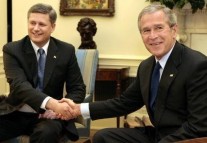Reminding them of the Christian name of where they were – on Île Jésus – a young mother yesterday urged the chairmen of Quebec’s “reasonable accommodations” commission not to forget their Roman Catholic heritage. Geneviève April also had a warning for Gérard Bouchard and Charles Taylor: Don’t promote the rise of Islam in Quebec, because it will erode the identity of young French Canadians like her two children, who are exposed to it at school and daycare.
“As a mother, I’m very worried,” said April, 30, whose young son attends a multi-ethnic school that is 70-per-cent allophone and where the pupils are of 45 nationalities. “Children are sponges, and if my children are taught by someone (who is Muslim), they’ll start asking themselves who they are,” said April, the first of two dozen people who addressed the commission yesterday in Laval.
Teachers and daycare workers in hijabs, for example, are a threat, because “children trust the people looking after them, and (wearing the hijab) is practically a kind of subversion, and I think that’s deplorable and shouldn’t be accepted.”
Bouchard, a veteran historian and sociologist who grew up Catholic in Chicoutimi, asked April whether it’s OK for parents to transmit their religion to their children. Absolutely, she replied, but “I don’t want Muslim parents transmitting their religion to my children.”
“Culture and religion are interrelated,” and whereas Islam has no roots here, “Quebec culture is completely filled with allusions to the Catholic religion,” she said, noting that the Highway 15 hotel where the Laval hearings are being held sits on Île Jésus.
At his multi-ethnic school, her son is “in a bath of cultures, and his identity will be put to the test,” April said. If his teacher wears a hijab and many of his classmates are Muslims, her son may one day decide to become Muslim himself, “just to be like his friends, and I wouldn’t like that,” April said.
“That’s why you’d like hijabs to be banned in schools?” Bouchard asked.
“Yes,” April replied.

 Canadian Prime Minister Stephen Harper said Sunday he disagrees with a decision to allow Muslim women to wear veils covering their faces when they vote.
Canadian Prime Minister Stephen Harper said Sunday he disagrees with a decision to allow Muslim women to wear veils covering their faces when they vote.